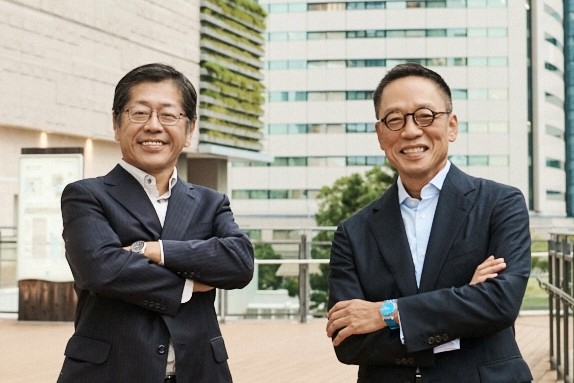
 |
| Hyundai Card CEO and Vice Chairman Chung Tae-young (right) and Sumitomo Mitsui Card Co. President Yukihiko Onishi pose for a picture after signing a deal at the SMCC headquarters in Tokyo on Wednesday. (Hyundai Card) |
Ten years and over a trillion won in investment — an extraordinary commitment to technology that few local finance companies can match.
Hyundai Card Vice Chairman and CEO Chung Tae-young has shown that this massive bet was not a gamble but a visionary investment positioning the company for the next era as the world accelerates into the age of artificial intelligence.
Last week, Hyundai Card signed a landmark deal with Japan’s Sumitomo Mitsui Card Co. to export its proprietary AI software, Universe. While the exact terms were not disclosed, the deal is valued at several tens of billions of won.
This achievement stands out not just for Hyundai Card but for the broader financial sector, marking the first time a Korean finance firm has developed and exported an AI platform built on its own technology. While financial institutions typically expand overseas by setting up branches, Hyundai Card is breaking new ground by selling its AI technology.
The milestone comes nine years after Chung launched the “Digital Hyundai Card” initiative, a strategic push to turn the company into a leader in data science.
Over the past decade, Hyundai Card has invested 30 percent of its operating profit into AI and data science, totaling one trillion won. Speaking to local reporters in May, Chung noted that this was only the beginning of the firm’s AI journey.
“The AI revolution will be more significant than the Industrial Revolution,” Chung predicted, adding, “Our company will focus on long-term success through data, not short-term gains.”
One key result of this long-term vision is Universe, a hyperpersonalized platform built on Hyundai Card’s AI technology. By using “tags” to structure and define data, Universe predicts customer behaviors and preferences, allowing businesses to engage their audiences more precisely. This technology has broad applications across industries.
SMCC, one of Japan’s top three credit card firms with 36.2 million cardholders — representing nearly 30 percent of the country's population—agreed to adopt Universe following a six-month validation process with Hyundai Card that began in February. Given the notoriously high barriers that Japan’s financial sector sets against foreign players, the deal stands as a strong endorsement of Hyundai Card’s AI expertise.
“After thorough testing, we became confident in Hyundai Card’s ability to analyze and structure data,” an SMCC spokesperson said.
By overcoming this high bar, Hyundai Card has taken a critical first step in its digital expansion. According to the company, other affiliates of Sumitomo Mitsui Financial Group, SMCC’s parent, as well as leading global financial institutions, have expressed interest in adopting Universe. Inquiries are coming from regions including North America, Europe, the Middle East and Asia.
“This deal underscores Hyundai Card’s evolution into a tech company and its expanded global presence through technology,” a company official said. “We expect to accelerate our global outreach through data science.”
Vice Chairman Chung is renowned for his innovative leadership, guiding Hyundai Card beyond its traditional role as a card issuer into new sectors.
Since taking office in 2003, Chung has transformed Hyundai Card by prioritizing branding and marketing, blending style and culture to revamp its identity. His initiatives, including iconic text designs, distinctive card colors and large-scale cultural events like Super Concert, have established Hyundai Card as a cultural leader.
Chung was also instrumental in launching Apple Pay in Korea last year. As its sole local partner, Hyundai Card grew to become the country’s third-largest card issuer.
Chung's latest focus on data science is already yielding significant accomplishments. Hyundai Card has led the Private Label Credit Card business in Korea, creating tailored marketing solutions for partners through data analytics. The company currently has 19 local and global PLCC partners. Last year, it signed a deal with Visa, the world’s largest payment company, to globalize its data analytics platform.









